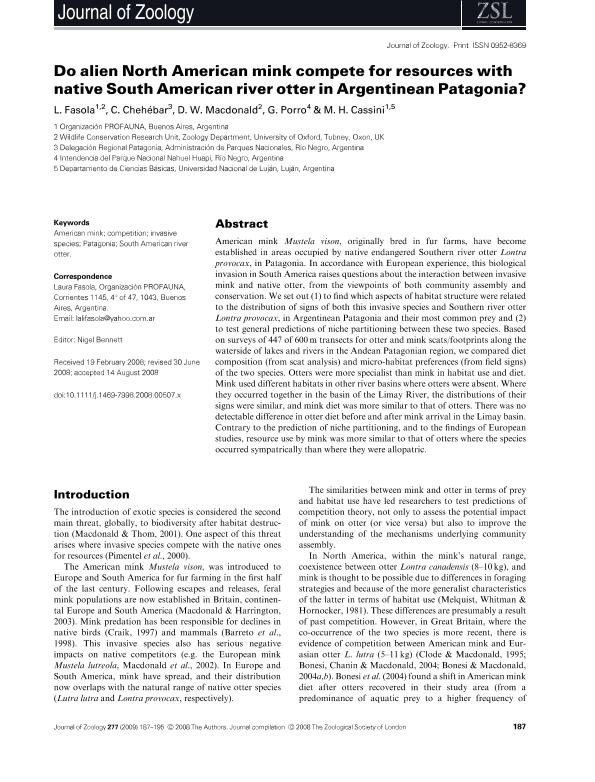Mostrar el registro sencillo del ítem
dc.contributor.author
Fasola, Laura

dc.contributor.author
Chehébar, C.
dc.contributor.author
MacDonald, D.W.
dc.contributor.author
Porro, G.
dc.contributor.author
Cassini, Marcelo Hernan

dc.date.available
2021-02-17T19:20:29Z
dc.date.issued
2009-03
dc.identifier.citation
Fasola, Laura; Chehébar, C.; MacDonald, D.W.; Porro, G.; Cassini, Marcelo Hernan; Do alien North American mink compete for resources with native South American river otter in Argentinean Patagonia?; Wiley Blackwell Publishing, Inc; Journal Of Zoology; 277; 3; 3-2009; 187-195
dc.identifier.issn
0952-8369
dc.identifier.uri
http://hdl.handle.net/11336/125843
dc.description.abstract
American mink Mustela vison, originally bred in fur farms, have become established in areas occupied by native endangered Southern river otter Lontra provocax, in Patagonia. In accordance with European experience, this biological invasion in South America raises questions about the interaction between invasive mink and native otter, from the viewpoints of both community assembly and conservation. We set out (1) to find which aspects of habitat structure were related to the distribution of signs of both this invasive species and Southern river otter Lontra provocax, in Argentinean Patagonia and their most common prey and (2) to test general predictions of niche partitioning between these two species. Based on surveys of 447 of 600 m transects for otter and mink scats/footprints along the waterside of lakes and rivers in the Andean Patagonian region, we compared diet composition (from scat analysis) and micro-habitat preferences (from field signs) of the two species. Otters were more specialist than mink in habitat use and diet. Mink used different habitats in other river basins where otters were absent. Where they occurred together in the basin of the Limay River, the distributions of their signs were similar, and mink diet was more similar to that of otters. There was no detectable difference in otter diet before and after mink arrival in the Limay basin. Contrary to the prediction of niche partitioning, and to the findings of European studies, resource use by mink was more similar to that of otters where the species occurred sympatrically than where they were allopatric.
dc.format
application/pdf
dc.language.iso
eng
dc.publisher
Wiley Blackwell Publishing, Inc

dc.rights
info:eu-repo/semantics/openAccess
dc.rights.uri
https://creativecommons.org/licenses/by-nc-sa/2.5/ar/
dc.subject
AMERICAN MINK
dc.subject
COMPETITION
dc.subject
INVASIVE SPECIES
dc.subject
PATAGONIA
dc.subject
SOUTH AMERICAN RIVER OTTER
dc.subject.classification
Ecología

dc.subject.classification
Ciencias Biológicas

dc.subject.classification
CIENCIAS NATURALES Y EXACTAS

dc.title
Do alien North American mink compete for resources with native South American river otter in Argentinean Patagonia?
dc.type
info:eu-repo/semantics/article
dc.type
info:ar-repo/semantics/artículo
dc.type
info:eu-repo/semantics/publishedVersion
dc.date.updated
2021-01-18T14:18:03Z
dc.journal.volume
277
dc.journal.number
3
dc.journal.pagination
187-195
dc.journal.pais
Reino Unido

dc.journal.ciudad
Londres
dc.description.fil
Fil: Fasola, Laura. University of Oxford; Reino Unido. Consejo Nacional de Investigaciones Científicas y Técnicas. Centro Austral de Investigaciones Científicas; Argentina
dc.description.fil
Fil: Chehébar, C.. Administración de Parques Nacionales; Argentina
dc.description.fil
Fil: MacDonald, D.W.. University of Oxford; Reino Unido
dc.description.fil
Fil: Porro, G.. Administración de Parques Nacionales. Parque Nacional "Nahuel Huapi"; Argentina
dc.description.fil
Fil: Cassini, Marcelo Hernan. Universidad Nacional de Luján; Argentina. Consejo Nacional de Investigaciones Científicas y Técnicas; Argentina
dc.journal.title
Journal Of Zoology

dc.relation.alternativeid
info:eu-repo/semantics/altIdentifier/url/https://zslpublications.onlinelibrary.wiley.com/doi/abs/10.1111/j.1469-7998.2008.00507.x
dc.relation.alternativeid
info:eu-repo/semantics/altIdentifier/doi/https://doi.org/10.1111/j.1469-7998.2008.00507.x
Archivos asociados
